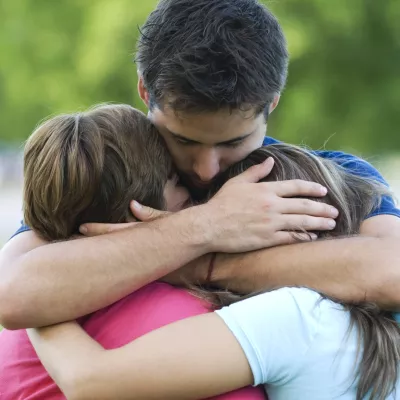- AdventHealth Hendersonville

Choose the health content that’s right for you, and get it delivered right in your inbox.
Growing up is hard. Most everyone who has been through adolescence would agree that being a teenager has its ups and downs. When we look at the mental health of our kids, their friendships and relationships play important roles. Unhealthy friendships can lower your child’s self-esteem, cause irrational behaviors and lead to misunderstandings, but they can also be learning opportunities when handled appropriately.
With this in mind, we asked Dr. Elizondo Vega , our adolescent medicine physician, to explain what parents can be on the lookout for when it comes to who their children are spending time with — both in person and online.
Is there a pattern when it comes to where unhealthy relationships are forming?
“The newest pattern that we are seeing is that of online friendships. Technology has been such as blessing, particularly during the COVID-19 pandemic, for allowing teens to stay connected. Healthy friendships can be maintained by technology, particularly when using real-time face-to-face communication platforms, like FaceTime,” Dr. Elizondo Vega explains.
However, some teens are gravitating towards various messaging apps, usually because of a common interest such as art or video games, where they ultimately end up networking with strangers.
“Parents can try to facilitate opportunities for their kids to connect with peers in the local community through school, sports, religious organizations or other youth development activities to possibly avert some of the potential negative consequences associated with online relationships.”
Parents can also try to limit screen time and their child’s phone use. What works for one family may not work for another, but setting a cutoff time for electronics could be a good place to start, such as no phones or computers/tablets after 8 pm. It’s also important to keep tabs on what your child has access to online. For the appropriate age groups, parental control features on smart phone apps may come in handy.
What warning signs of an unhealthy relationship should parents be watching for?
“One red flag that a relationship may be unhealthy is if your child’s friend is too controlling, not allowing your child to befriend others and monopolizing your child’s time.”
While it is normal, particularly for younger adolescents, to have someone they call a “best” friend, it is still important that each child in the relationship have the freedom to spend time with others and pursue their own interests, as well as the opportunity to spend time alone or with family.
“Other red flags that your child may be in an unhealthy relationship might include peers using your child for their own benefit (invitations, tickets, popularity) or regularly making fun of or criticizing your child.”
With romantic relationships, what warning signs should parents be watching for?
“In romantic relationships, it is also critical to ensure that the significant other is not attempting to monopolize your teen’s time. While the two may be ‘head over heels’ for one another and want to spend a lot of time together, a romantic partner that gets angry if your teen spends time with others or exhibits jealousy regularly are likely signs of an unhealthy romantic relationship.”
Similarly, if your teen’s significant other is monitoring your teen’s phone activity or whereabouts constantly, this may be a sign of an unhealthy relationship that could even lead to intimate partner violence.
“Another general good rule of thumb is to ensure that your teen only dates others who are very close in age, perhaps within a one-to-two-year age difference, at most. There are just too many developmental differences between an early adolescent and a late adolescent that could result in misunderstanding, undue pressure or power differentials.”
There’s more information about promoting healthy teen relationships provided here by the Centers for Disease Control and Prevention (CDC).
In what ways can negative relationships impact a child’s mental health?
“Unhealthy relationships can lead to a lot of self-doubt but can also be opportunities for growth. These are the sorts of life stressors that help children learn to set their own standards for self-worth, as opposed to allowing themselves to be defined by others.”
“Regular communication and oversight by parents and other trusted adults can help ensure that children and teens navigate the complexities of unhealthy relationships safely while learning from the experiences. While each person needs to protect themselves from the emotional fallout of unhealthy relationships, these sorts of life experiences are also opportunities to practice grace, compassion and forgiveness.”
Keep the door of communication open so your child feels comfortable sharing with you, whether it’s something positive or not. Remember to ask questions about friends, their plans, who they will be with, etc. Depending on your child’s age, you could ask them to text or call you when they get to their destination, notify you if plans change, and set a curfew.
While some relationships need to be severed for the physical and/or emotional safety of a child or teen, sometimes relationships can be repaired by learning to see things from someone else’s perspective, giving people a second chance, having open communication and realizing that someone who is being hurtful may be going through something themselves.
Getting to know your child’s friends and who they spend time with can help you to stay aware of their surroundings. “One of the best things you can do to understand and support your child’s friendships is to connect with the parents of their friends. This way, you can all feel more comfortable knowing who they are spending their time with.”
Support for Your Child
At AdventHealth for Children, we’re here to support you and your family through every stage of your child’s life. For mental health resources, visit RaceForMentalHealth.com.



